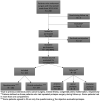Treatment of apical vaginal prolapse with minimal mesh repair (Uphold): patient-reported long-term outcomes and mesh-related complications
- PMID: 35150002
- PMCID: PMC9564603
- DOI: 10.1111/aogs.14322
Treatment of apical vaginal prolapse with minimal mesh repair (Uphold): patient-reported long-term outcomes and mesh-related complications
Abstract
Introduction: To evaluate patient-reported outcomes and clinical findings after surgery for apical prolapse with the transvaginal Uphold mesh technique. Moreover, to evaluate the rate of mesh-related complications.
Material and methods: A historical cohort study of patients who underwent surgery from January 1, 2012 to April 30, 2019, at Aarhus University Hospital, Denmark. Pelvic examination and patient completion of questionnaires were performed in 2018-2019. Information on adverse events and reoperations was obtained from medical records.
Results: A total of 240 patients were operated on using the Uphold mesh, 89% due to recurrent prolapse. Follow-up was attended by 192 patients (80%). Median follow-up time was 30 months, interquartile range 19-52. During follow-up, 29 patients (15%) underwent reoperation due to prolapse and are considered failures. Among the remaining, patient satisfaction was high. Thus, average score for pelvic symptoms affecting daily life was 2, on a scale of 0-10, where 0 represents no symptoms. The Patient Global Impression of Improvement (PGI-I) had an average score of 6.4 (1: very much worse; 7 very much better). Preoperatively, 89.5% of the women had grade 2 or more apical prolapse, whereas at follow-up, this was only 6.1%. Perioperative heavy bleeding needing embolization was observed in one patient (0.5%). Two patients had serious constriction of the ureter and needed re-operation. Postoperative complications, primarily temporary voiding problems, were observed in 15 patients (8%). Complications during the follow-up period were registered in 23 patients (12%); eight of these were mesh erosions. Due to complications, 11 patients (6%) needed re-operation.
Conclusions: The study confirms that the Uphold procedure in a centralized set-up is a procedure with high patient-reported satisfaction even in a population characterized by a high proportion of recurrent prolapse. Moreover, the procedure seems safe with acceptable complication rates.
Keywords: apical compartment; complications; patient-reported outcomes; pelvic organ prolapse; recurrent prolapse; transvaginal mesh.
© 2022 The Authors. Acta Obstetricia et Gynecologica Scandinavica published by John Wiley & Sons Ltd on behalf of Nordic Federation of Societies of Obstetrics and Gynecology (NFOG).
Conflict of interest statement
SG, SMA and MG‐K have received travel grants from Astellas. KMB has received speaker honorarium from BK Ultrasound. AM declares no conflicts.
References
-
- Maher C. ICI 2012: pelvic organ prolapse surgery. Int Urogynecol J. 2013;24:1781. - PubMed
-
- Kalkan U, Yoldemir T, Ozyurek ES, Daniilidis A. Native tissue repair versus mesh repair in pelvic organ prolapse surgery. Climacteric. 2017;20:510‐517. - PubMed
-
- Maher CM, Feiner B, Baessler K, Glazener CM. Surgical management of pelvic organ prolapse in women: the updated summary version Cochrane review. Int Urogynecol J. 2011;22:1445‐1457. - PubMed
-
- U.S. Food and Drug Administration . Urogynecologic surgical mesh implants. 2021, August 16. https://www.fda.gov/medical‐devices/implants‐and‐prosthetics/urogynecolo...
MeSH terms
LinkOut - more resources
Full Text Sources
Medical
Miscellaneous


